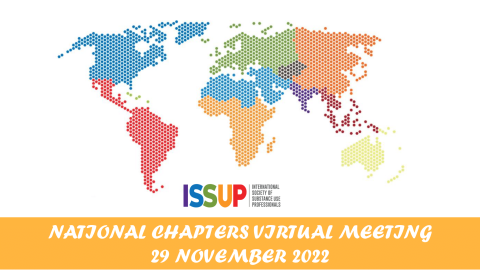The ISSUP National Chapters general meeting was held virtually on Tuesday 29th November 2022. This is the first time the National Chapters were meeting as a group after the amazing in-person experience in Abu Dhabi.
26 out of 34 established chapters were present at the meeting together with representatives from INL, Global Centre for Credentialing and Certification (GCCC) and ISSUP Global.
This meeting provided a unique opportunity to recap the year 2022, follow-up on the Abu Dhabi action plan and strategize for the new year. The agenda included an update on the upcoming ISSUP conferences, ISSUP communications, credentialing and National Chapter Sustainability.
Sustainability and fundraising
Talking on the issue of funding and sustainability, Livia Edegger hinted at the ongoing development of an ISSUP sustainability guide for National Chapters and the soon-to-be implemented “Donate to Us” button on the ISSUP website. The guide under development explores topics such as Awareness and Fundraising, Crowdfunding, Engaging Donor Agencies, Funding proposals and Work with Embassies.
These funding strategies add on to the sustainability initiatives proposed by INL:
- Small grants programme in partnership with OAS/CICAD and Colombo Plan
- Potential collaboration with eligible National Chapters in disseminating the educational curriculum.
Communications
James Harvey led the group through a very interactive session on the role of the National Chapters in ISSUP communications and the potential of the ISSUP website to enhance National Chapter visibility. The breakout room discussions as part of this session resulted in many potential media actions for 2023.
Webinars
Olivia Woodrow delivered a brief overview of the revised webinar process and the webinars held between May 2022 to November 2022. The National Chapter leads were informed of an upcoming set of guidelines that outlines the revised process.
Prevention Questionnaire
Jeff Lee provided an update on the recently circulated questionnaire on the prevention related needs of the National Chapters. 14 National Chapters responded. Most common responses pointed out the need for more training, convincing policy makers, engaging stakeholders and increasing public awareness. The proposed next steps included setting up a National Chapter Prevention team to develop an action plan based on these findings and embark on a skills audit.
Credentialing
Credentialing and certification were also major highlights of the meeting. Mr Morales called for a re-focus on trainings from solely educational purposes to training for the sake of credentialing and examination. The ISSUP National Chapters were tasked with the role of promoting credentialing amongst members and advocating for its recognition within countries.
Ms Becky Vaughn, the Director of GCCC, outlined the different credential levels, examinations and ICAP certification. Coming soon are specialty endorsements to demonstrate additional trainings in key areas such as Prevention. Basically, the role of GCCC is to provide experience, training verification and appropriate exams to ensure that employers including governments are hiring and utilizing the most qualified addiction professionals.
The Online Universal Curriculum can be accessed on the ISSUP website via https://www.issup.net/training/online-learning-hub
Mentoring
Anthony Abi Zeid updated the National Chapters on the recently initiated Mentorship/Buddy program between ISSUP Lebanon (Mentor) and ISSUP Gambia (Mentee). This program is primarily targeted at relatively newer Chapters, and it is to encourage the transfer of knowledge and best practices. The initiative not only enables cross-cultural communication but enhances access to information from like-minded organizations working in similar circumstances at the field level.
Overall, the National Chapters online meeting was a huge success. We could not agree more with Mr Brian Morales when he says, “At the very heart of the drug demand reduction ecosystem is ISSUP. ISSUP as the network connecting all other relevant networks and the National Chapters are the in-country representation of that valuable system”.


